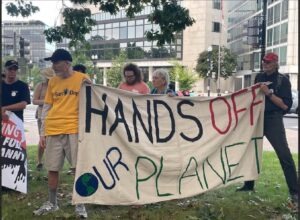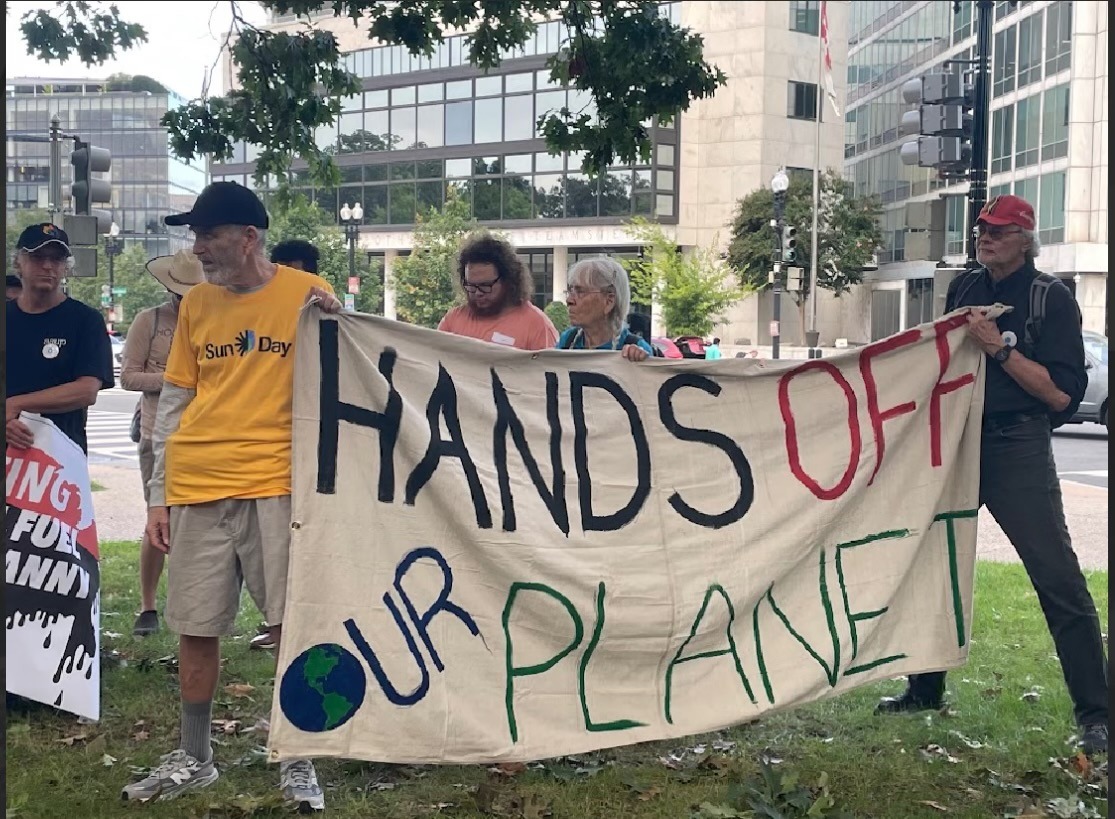 Climate groups led multiple actions against fossil fuel based energy companies across Washington DC Thursday and Friday. Photo: Courtesy of Beyond Extreme Energy
Climate groups led multiple actions against fossil fuel based energy companies across Washington DC Thursday and Friday. Photo: Courtesy of Beyond Extreme Energy
Wadhington DC—A broad coalition of oil and gas watchdog groups mobilized Thursday morning to demand the fossil industry obey DC Circuit Court orders to uphold greenhouse gas release standards. The groups Beyond Extreme Energy (BXE), Third Act National Organization, Elders Coalition For Climate Action, Third Act Actions Lab, Hold The Line Campaign, a Texas frontline organization, and Corpus Youth Habitat for Recovery Project, a grassroots youth-led group, were involved in the coalition partnership actions.
They held the actions to oppose recent cuts continue holding the Federal Energy Regulatory Commission (FERC), oppose project and staffing cuts at the Environmental Protection Agency, and expose major gas and oil lobbies and financial institutions in Washington DC. They were also calling out the $1 billion oil and gas donations to the 2024 Trump election campaign.
The climate groups staged three actions over Thursday and Friday as a lead-off to ‘Sun Day’ climate actions planned across the country over the weekend. A major protest was scheduled against oil and gas companies and financiers in New York City.
Thursday morning, activists met at 9 am at FERC, on 1st Street NE for a “unique” action to demand Commissioners obey DC Circuit Court orders to stop new fossil fuel projects until FERC considers greenhouse gas emissions as part of its project studies. This action was a disruption of FERC’s monthly meeting, a rally outside FERC, and a chorus of protesters chanting in the lobby of FERC which could be heard inside during meeting proceedings.
Thursday afternoon at 2pm activists met for a solemn walk beginning on the National Mall at Madison Drive NW and 12th Street NW, to the Environmental Protection Agency for a die-in. Trump appointed EPA administrator, Lee Zeldin, who in January began the biggest deregulatory action in U.S. history, including a repeal of the endangerment finding, a key climate policy passed into law in 2009. Activists and frontline communities led by the Elders Coalition for Climate Action met to expose the EPA for what could be one of the most devastating revocations of climate policy protections passed into law. Zeldin is undoing 56 years of environmental protections, including the Clean Air and Clean Water Acts, implemented at the EPA and improved in the decades since the EPA was created under the Richard Nixon Administration in 1970.
On Friday. September 19, Elders and members of Gulf Coast communities met at 200 New Jersey Avenue Southeast, Lower Senate Park, for a tour of the fossil energy trade associations responsible for capturing control of government energy policy. Led by Elders Climate Actions Lab, frontline community members visited multiple oil and gas trade associations. These trade associations are responsible for lobbying and funding both the Republican and Democratic parties and guaranteeing the petroleum industry continues flushing the economy with fossil based products.
FERC — “Rubber Stamp” Of The Fossil Fuel Industry
In Washington DC the actions kicked off on Thursday morning with a unique action at FERC designed to disrupt its monthly meeting of fossil fuel industry insiders and permit applicants. The public has not ever been allowed to testify at the monthly FERC meetings, which are essentially a panel of five commissioners who have consistently voted lockstep with fossil industry requests on virtually every oil and gas project it has sought approval.
BXE has been involved with monthly meeting disruptions for the 11 years the grassroots climate watchdog was first founded. The disruptions usually consisted of popcorn outbursts from affected frontline community members who have been denied an opportunity to publicly express their objections into the meeting record. Popcorn outbursts are staged disruptions unevenly timed to delay and theart meetings.
According to Ted Glick, an organizer with BXE, there have been many incidents of private citizens having their land seized by oil and gas companies under the provisions of eminent domain. These land seizures have usually been among black and brown communities, with little political power or financial resources to fight deep-pocket fossil lobbyists. The result is land owners have limited recourse over the domain their property. The land is permanently degraded as a result, usually with a limited value being paid from the oil and gas industry to the owners. The oil and gas companies then have free indefinite use of the land over which they build their pipelines.
Once activists disrupt the meeting, FERC Commissioners pause the meeting, turn off the video recording, FERC security try to quickly remove the disrupting citizens, and the citizens are permanently banned from future FERC meetings. The meetings are disrupted for anywhere from 4-7 minutes while security removes the activists.
The Institute for Justice published on its website that eminent domain was intended to be a narrow power and has rightly been called a “despotic” power of government, given its vast potential for abuse: It can destroy lives and livelihoods by uprooting people from their homes, businesses, and communities. Unfortunately, the U.S. Supreme Court wrote a blank check for local and state governments to abuse eminent domain in the now infamous Kelo v. New London decision. IJ represented Susette Kelo and other homeowners in New London, Conn., to save their homes from being demolished. But in a narrow 5-4 decision, the Supreme Court instead upheld the taking of their homes under the guise of “economic development.”
It has been this ‘despotic’ power that BXE has challenged at FERC over the past 11 years. Citizens have disrupted monthly meetings consistently over land grabs. The methane pipeline buildout of fracked gas from shale has been an example of how the gas and oil industry has seized thousands of miles of private citizens’ land to build pipelines over which citizens have no recourse. The interstate pipelines are often hundreds of miles long, meaning compression stations must be built with further confiscation of private land.
A key demand is that FERC commissioners follow the decision of the DC Circuit Court ruling to halt new fossil fuel projects until they consider how greenhouse gases (mainly carbon and methane) affect Black and Brown communities. These are often the frontline communities most affected by fossil fuel projects.
But a major concern of the climate groups stems from the worsening climate emergency. Their actions are designed to ramp up public attention to the worsening livability of the planet before it is too late to change course on th climate. Evidence of increasing extreme weather events, droughts, floods, and temperature rises have either met or exceeded the limits of human carbon emissions which the International Global Panel on Climate has determined is a red line to keeping the planet from becoming unlivable in the next century.
Then there is the issue of renewable energy sources which the Trump government is standing against. While many nations are investing in renewable energy sources, the U.S. is reverting its focus to oil and gas and investing in the non-renewable fossil energy sector projects. China is leaping ahead in renewable technologies at an ambitious pace, building solar energy infrastructure into its grid while the U.S. is still building pipelines, compressor stations, and export terminals.
According to Ted Glick, this short-term profit based policy is at odds with what U.S. energy policy should be.
The International Energy Agency (IEA) publishes monthly reports of global energy production and consumption. The U.S. is falling behind in the transition from fossil fuels to renewable sources. Asia, Europe. The Middle East, and South America are reducing their dependence on fossil fuel sources while the U.S. is moving in the opposite direction under Trump directed energy policy. Their September 17 report shows global coal energy generation is at its lowest level since 2020 and solar and wind energy generation and consumption is at its highest level ever recorded. Meanwhile, the U.S. is the only nation that is increasing its oil and methane production compared with the other 45 countries in the Organization for Economic Cooperation and Development (OECD).
Frontline Communities Join Cimate Fight
Alyssa Portaro, Founder and Director, Habitat Recovery Project, Cameron Parish, Louisiana, said in a press release, “We are proud to bring a Cameron Parish commercial fisher family to DC to highlight the harms of fossil fuel infrastructure in key biological areas. This place was once Seafood Capital of the United States, and is now home to the largest gas buildout in the world with LNG Export Facilities. Fisher families are seeing entire estuaries decimated by the construction of LNG exports, declines in fisheries species, sunken oyster boats in the wake of tanker ships. We need to see harms of LNG mitigated, and construction halted until fisher families directly impacted have a seat at the table for planning ecological repair and see just compensation for losses.“
Armon Alex with the Gulf of Mexico Youth Climate Summit, said, “Our communities along the Gulf of Mexico have been treated as sacrifice zones for far too long. We live with refineries, LNG export terminals, and petrochemical plants in our backyards, where the cost is our health, our air, and our futures. This is environmental racism at work. Black, Brown, and Indigenous families bear the burden of industry while billionaires profit. The devastation from fossil fuel infrastructure is our daily reality. Our political and economic systems have failed Gulf communities but we refuse to accept this as normal. The Gulf deserves clean air, safe water, and neighborhoods where people thrive, not corporate greed.“
